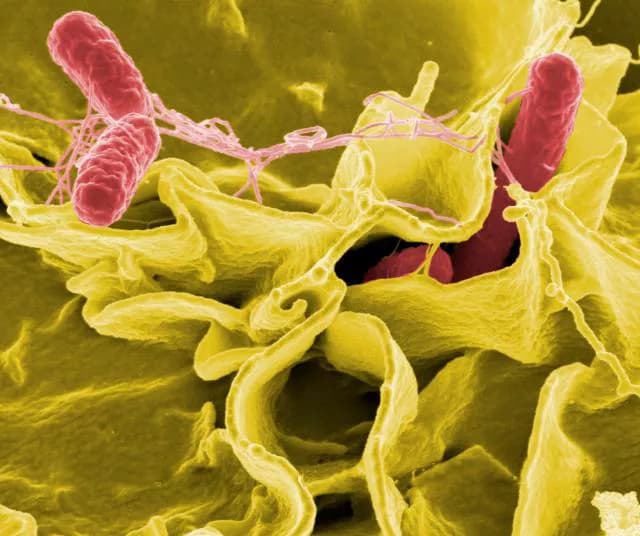
New Insights On How Pathogens Escape The Immune System
Our immune system has various ways to deal with threats from the outside like pathogens. One of the defence mechanisms is a process called autophagy. 'You can imagine autophagy as the vacuum cleaner of the cell', says Nirmal Robinson, leading scientist of the study. 'It keeps the cell clean by clearing and degrading pathogens or damaged parts of the cell.' This prevents the toxic accumulation of cellular waste and thus preserves the function of cellular organelles. A decline in autophagy also plays an important role in aging and longevity. If the genes linked to autophagy are deleted in animals like the nematode C. elegans, a decrease in lifespan and early onset of aging can be observed.
For his current research Robinson used the bacterium Salmonella typhimurium. With 13,823 reported cases in Germany in 2015, Salmonella infections belong to the group of common infectious diseases in humans. In healthy patients, symptoms are gone without antibiotic treatment, but in risk groups such as old people or immune-deficient persons, the risk of serious illness remains. This pathogen is known to escape the process of autophagy. The goal of the researchers was to understand how this pathogen identifies these processes and tricks them. They found that two proteins called Sirtuin1 and AMPK, which sense changes in the metabolism, were reduced upon infection. Usually, the loss of energy within the cell is detected by AMPK, and it gets activated resulting in autophagy. Sirtuins are another class of metabolic sensors, and their action is dependent on the metabolite NAD+. Together they help in inducing autophagy when there is an energy demand. During infection, there is an energy loss that would normally enhance autophagy. For Robinson's research, immune cells were infected with the pathogen. As expected, energy levels dropped. One would then expect that AMPK gets activated -- and so it does, but only for a very short time. Although energy levels are low, the activation is not sustained. Further investigations on the process revealed the mechanism. Soon after infection, the proteins required to activate autophagy get degraded in lysosomes (a membranous bag containing degrading enzymes). 'The pathogen dismantles the machinery by targeting it for degradation and thereby escapes the immune system', says Robinson.
Nirmal Robinson hopes to use this improved understanding of the process of autophagy in the search for therapeutic applications. 'We can learn to make use of this pathway.' For example, cancer cells upregulate autophagy to survive stressful conditions and to increase growth. They would like to manipulate the process to strengthen or to weaken the level of autophagy in the way they need it. He compares his research to an everyday situation: 'Pathogens are like burglars. By following a burglar we can also identify where we are weak.' By understanding host-pathogen interaction we can understand more about ourselves and how we are designed to protect ourselves against dangerous threats.
Materials provided by University of Cologne. Note: Content may be edited for style and length.
Disclaimer: DoveMed is not responsible for the accuracy of the adapted version of news releases posted to DoveMed by contributing universities and institutions.
Primary Resource:
Ganesan, R., Hos, N. J., Gutierrez, S., Fischer, J., Stepek, J. M., Daglidu, E., ... & Robinson, N. (2017). Salmonella Typhimurium disrupts Sirt1/AMPK checkpoint control of mTOR to impair autophagy. PLoS pathogens, 13(2), e1006227. DOI: 10.1371/journal.ppat.1006227
Related Articles
Test Your Knowledge
Asked by users
Related Centers
Related Specialties
Related Physicians
Related Procedures
Related Resources
Join DoveHubs
and connect with fellow professionals

0 Comments
Please log in to post a comment.